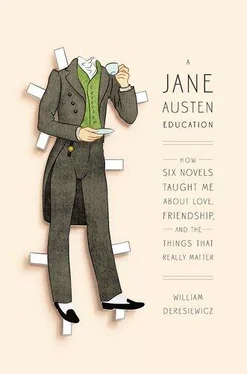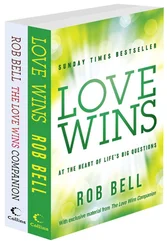William Deresiewicz
A Jane Austen Education:
How Six Novels Taught Me About Love, Friendship, and the Things That Really Matter
To Jill,
and to the memory of Karl Kroeber
Chapter 1
emma everyday matters
I was twenty-six, and about as dumb, in all human things, as any twenty-six-year-old has a right to be, when I met the woman who would change my life. That she’d been dead for a couple of hundred years made not the slightest difference whatsoever. Her name was Jane Austen, and she would teach me everything I know about everything that matters.
The thing that takes my breath away when I think back on it all is that I never wanted to read her in the first place. It happened quite by accident, and very much against my will. I had been eager, when I’d gone back to school to get my Ph.D. the year before, to fill the gaps in my literary education—Chaucer and Shakespeare, Melville and Milton—but the one area of English literature that held no interest for me, that positively repelled me, was nineteenth-century British fiction. What could be duller, I thought, than a bunch of long, heavy novels, by women novelists, in stilted language, on trivial subjects?
The very titles sounded ridiculous. Jane Eyre. Wuthering Heights. Middlemarch. But nothing symbolized the dullness and narrowness of that whole body of work like the name Jane Austen. Wasn’t she the one who wrote those silly romantic fairy tales? Just thinking about her made me sleepy.
What I really wanted to study was modernism, the literature that had formed my identity as a reader and, in many ways, as a person. Joyce, Conrad, Faulkner, Nabokov: complex, difficult, sophisticated works. Like so many young men, I needed to think of myself as a rebel, and modernism, with its revolutionary intensity, confirmed my self-image. I’d pass my days in a cloud of angry sarcasm, making silent speeches, as I stalked down Broadway in my John Lennon coat, against everything conventional, respectable, and pious. I’d walk right up alongside the buildings, in the shadows—it makes you feel like a rat scuttling for cover—to aggravate my sense of alienation. If I was waiting for someone and had nowhere else to go, I’d sit right down on the sidewalk with my Kerouac or my Catch-22, just you try and stop me. I smoked weed, listened to the Clash, and snorted at the business monkeys who’d sold out to the Man. Like the modernists, I was hot to change the world, even if I wasn’t sure exactly how. At the very least, I knew I wasn’t going to let the world change me. I was Dostoyevsky’s Underground Man, raging against the machine. I was Joyce’s Stephen Dedalus, the rebel artist who runs rings around the grown-ups. I was Conrad’s Marlow, the world-weary truth teller who punches through hypocrisy and lies.
Needless to say, I was not the easiest person to get along with. In fact, I wonder that my friends put up with me at all. Like so many guys, I thought that a good conversation meant holding forth about all the supposedly important things I knew: books, history, politics, whatever. But I wasn’t just aggressively certain of myself—though of course I never let anyone finish a sentence and delivered my opinions as if they’d come direct from Sinai. I was also oblivious to the feelings of the people around me, a bulldozer stuck in overdrive, because it had never occurred to me to imagine how things might look from someone else’s point of view.
My best friend, who knew me better than I knew myself, once introduced me to a friend of hers named Honour. Just as I was gearing up to reel off all the stupid puns I could think of—“Your Honor,” “Honored to meet you,” and so forth—my friend caught the smirk spreading across my face and cut me off before I could make an idiot of myself. “Billy,” she explained with the weary patience with which you might address a difficult child, “she’s already heard them all.” Basically, I had no insight into myself or anyone else.
My romantic life, not surprisingly, had never been particularly happy. I was stuck at the time in a relationship that should have ended long before. We had jumped each other one night the previous summer, and though we’d been together for over a year, we had little in common and had never much progressed beyond the sex. She was gorgeous, bisexual, impulsive, experienced, with a look that knew things and a laugh that didn’t give a damn. We would go to bed, and then we would go dancing, and then we would go to bed again.
But as for anything like real intimacy, I just couldn’t manage it. I’d had girlfriends before, including ones I’d even thought I’d loved, but things had always ended badly: fights, sulks, head games, tears. Eventually, good riddance. At least this time we didn’t fight. We didn’t talk, either—not about anything real, not about what was going on with us or what we might have been feeling. Instead, I’d hold forth as usual, even think I was doing her a favor in the process. I was a graduate student at Columbia, after all, and she had barely scraped through college. I was going to do something important with my life, and she was marking time as a waitress—a job that struck me as depressingly unambitious—while she tried to figure out her next move. In short, I didn’t respect her enough to imagine that she might have anything to say to me that was worth listening to.
I knew it wasn’t a real relationship, but I kept telling myself that this was what I’d always wanted. A steady supply of sex, with no strings attached: a teenage boy’s idea of paradise. Except I wasn’t a teenage boy anymore. Still, I thought—and this is how numb I was by then—well, so maybe I never will find that one person to love. So what? I knew, deep down, that the idea of doing without love for the rest of my life was completely absurd, that it was a sign of grave emotional peril that it could even occur to me, but I managed to keep the lid on my denial. Besides, I thought, as soon as you fell in love, people started expecting you to get married. And if there was one thing I knew, it was that I was never going to get married.
* * *
My second year in graduate school, I signed up for a class called Studies in the Novel, less because I knew anything about it than because it sounded like a good fit. Our first two books were Madame Bovary, the novel that raised the art of fiction to a new level of cultural esteem, and The Ambassadors, Henry James’s most honored masterpiece. So far, my need to study prestigious literature was being satisfied.
Then came Emma. I had heard some scattered talk, over the years, about its supposed greatness—one of the best novels in the language, more complex than anything in Joyce or Proust—but at first, my prejudices against Jane Austen were only confirmed. Everything was so unbearably banal. The story seemed to consist of nothing more than a lot of chitchat among a bunch of commonplace characters in a country village. No grand events, no great issues, and, inexplicably for a writer of romance novels, not even any passion.
Emma, it turned out, was Emma Woodhouse, “handsome, clever, and rich,” who lived with her feeble, foolish old father on their family estate of Hartfield. Her life was impossibly narrow. Her mother had died when she was a baby; her sister, Isabella, lived in London; and the governess who had raised her had just gotten married. Mr. Woodhouse himself was too much of a hypochondriac to even venture off the estate, and his best friends, who were forever dropping by, consisted of a sad, silly spinster named Miss Bates and her elderly mother, the widow of the old clergyman.
Читать дальше












